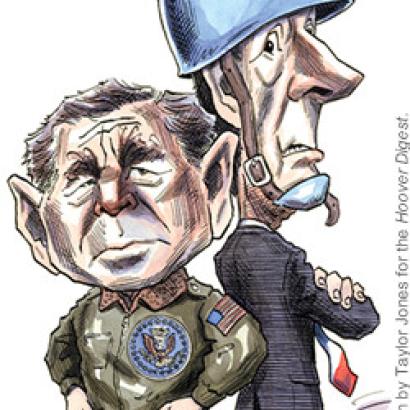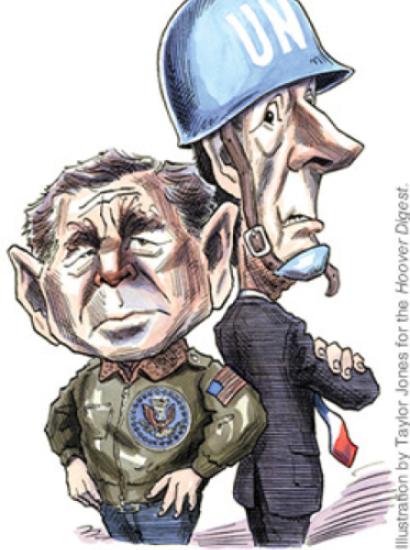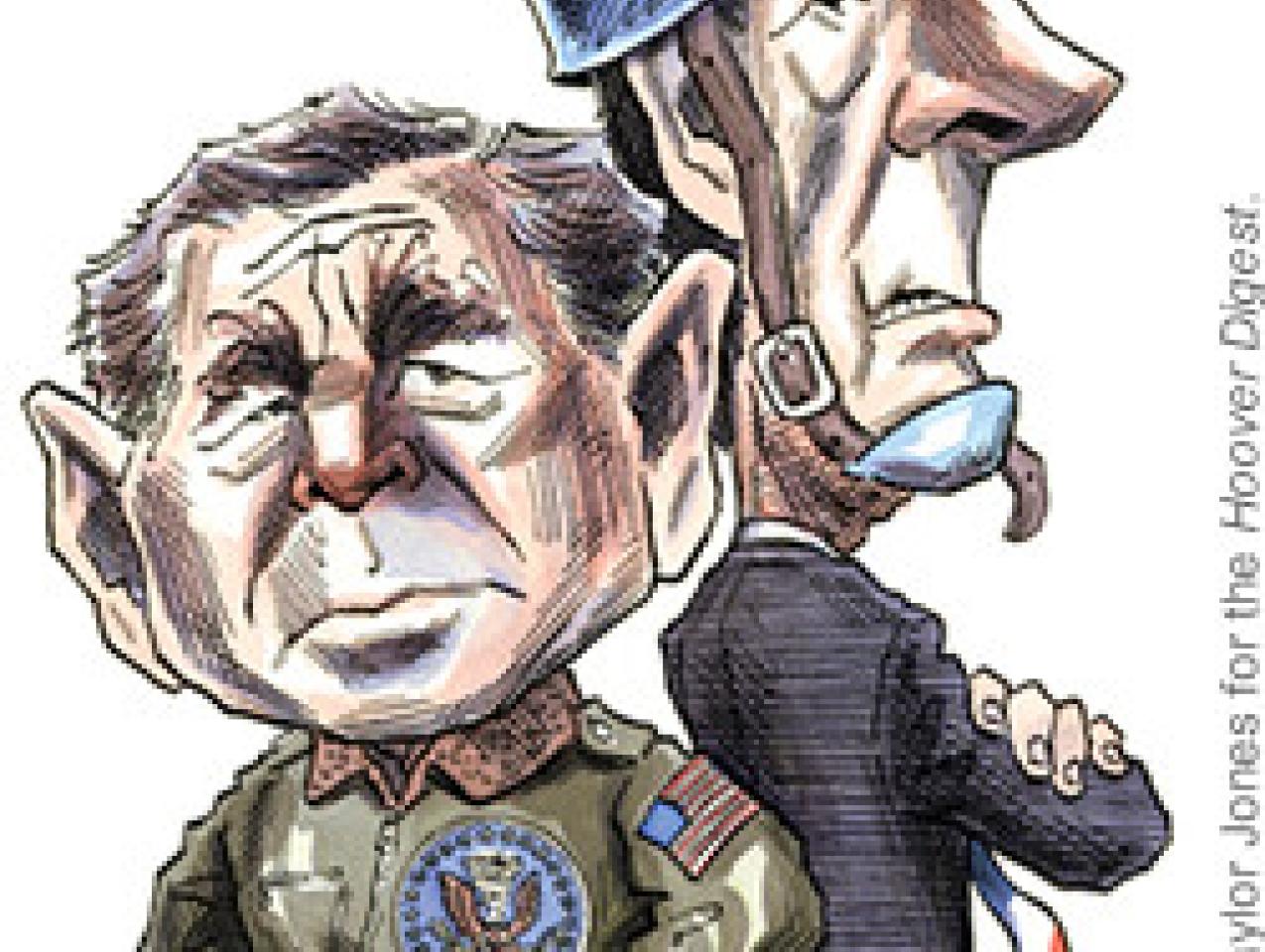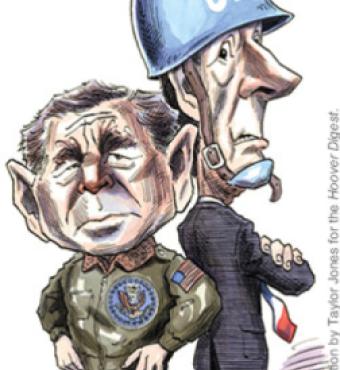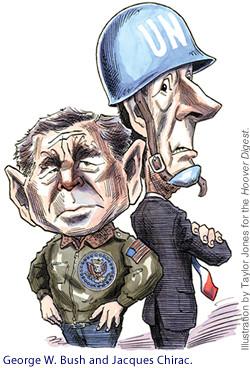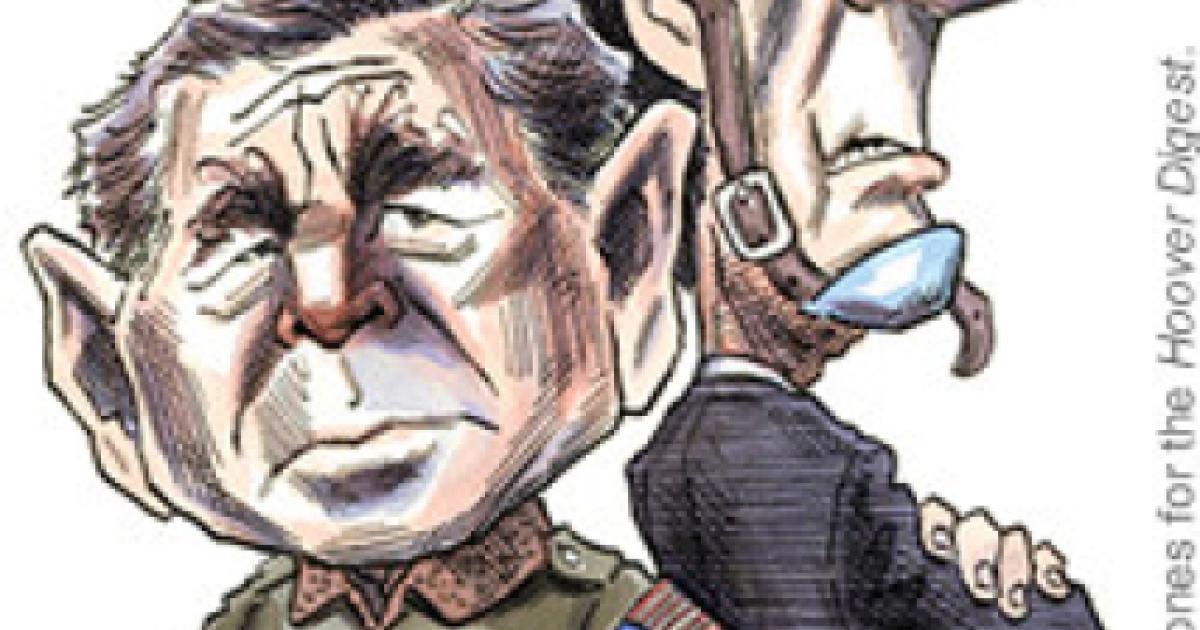- International Affairs
- History
- Military
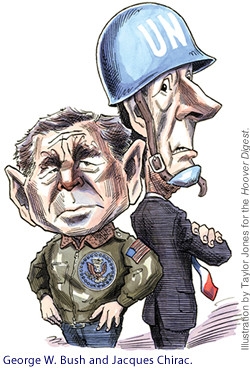
Anyone who watched the opening session of the United Nations in September 2003 was treated to some unusual political theater. Per tradition, the leaders of several nations offered some remarks to kick off the session. George W. Bush and French president Jacques Chirac both spoke.
Tension was thick. Just six months earlier the United States and France had disagreed about how to deal with Iraq’s violation of U.N. resolutions adopted in 1991 requiring it to disarm. The Security Council debates were heated, and when that body proved unable to reach an agreement on how to respond, the United States proceeded to assemble a coalition to disarm Iraq without a new U.N. resolution. The result was Operation Iraqi Freedom.
The most interesting thing about the speeches was how they departed from the usual pattern. In the past, officials usually spoke on behalf of their own country’s policies, but this time the issue was the role of the United Nations itself. Bush and Chirac offered very different views, and the episode captured a disagreement that has been simmering for some time. It’s worth reviewing because it has huge implications for American foreign policy.
Three Points of View
President Bush argued that, when governments disagree about how to deal with terrorists and rogue states, it is not a routine policy debate. Rather, there are moral principles at stake:
Events during the past two years have set before us the clearest of divides, between those who seek order and those who spread chaos; between those who work for peaceful change and those who adopt the methods of gangsters; between those who honor the rights of man and those who deliberately take the lives of men and women and children, without mercy or shame. Between these alternatives, there is no neutral ground.
All governments that support terror are complicit in a war against civilization. No government should ignore the threat of terror, because to look the other way gives terrorists the chance to regroup and recruit and prepare. And all nations that fight terror as if the lives of their own people depend on it will earn the favorable judgment of history.
Bush went on to draw the implications of this axiom for the status of the United Nations: defending security, freedom, and human rights is much more important than preserving any special status the United Nations might enjoy. Bush acknowledged the importance of some of the measures the Security Council had taken in the buildup to the war in Iraq, but he staked out a position that reaffirmed the sovereignty of nations and implied that the United Nations might be just one of several players that might act to ensure security—which is to say that the United Nations is not a supreme authority. Bush noted that it had taken a “coalition of nations” to enforce a U.N. resolution, largely because the United Nations as a whole would not.
Furthermore, Bush implied, the United Nations as a practical matter was dependent on sovereign nations for its credibility—hardly the position any organization presuming to be authoritative would care to find itself in.
Chirac offered a very different vision. According to the French president, the United Nations possesses unique legitimacy. Therefore, countries must acquire its permission before they take action to ensure security somewhere in the world. Get a Security Council resolution for a military operation, implies Chirac, and you are legal; act without one, and you are an outlaw. Moreover, Chirac suggested, nations that act in unison with others are moral; those that act alone are not: “Multilateralism is the key, for it ensures the participation of all in the management of world affairs. It is a guarantee of legitimacy and democracy, especially in matters regarding the use of force or laying down universal norms.”
The only deficiency of the United Nations, to Chirac’s mind, is that it lacks clout. So he proposed giving it more authority. Chirac wanted to make the General Assembly an authoritative “voice of the people.” Even more telling, Chirac drew a line in the sand, explicitly claiming that, even under the current rules, only the Security Council had the right to use force.
The verbal sparring between Bush and Chirac reflected arguments that took place between the two countries in the Security Council in the run-up to Operation Iraqi Freedom. During the sessions, France insisted that the U.N. inspectors be allowed to continue searching for the alleged weapons of mass destruction that many believed Iraq was hiding. The French delegation also insisted that no government could legitimately undertake military action until the Security Council gave its approval.
Secretary-General Kofi Annan also spoke at the session. He basically agreed with Chirac and attempted to base the authority of the United Nations on its Charter:
Since this organization was founded, states have generally sought to deal with threats to the peace through containment and deterrence, by a system based on collective security and the United Nations Charter.
Article 51 of the Charter prescribes that all states, if attacked, retain the inherent right of self-defense. But until now, it has been understood that when states go beyond that and decide to use force to deal with broader threats to international peace and security, they need the unique legitimacy provided by the United Nations.
However, unlike Chirac, Annan seemed to concede that the United States might have some valid arguments. The 2002 National Security Strategy of the United States had raised the possibility of U.S. preemption against terrorists and would-be proliferators. Annan implied that the United Nations would need to consider how to accommodate the policy. Also, Annan acknowledged some criticisms of his own organization, recognizing that the United Nations had not acted decisively in some earlier cases.
The Politics of Predominance
As is typical in such rhetoric, much of what the players are really saying lies beneath the surface. It wasn’t just the U.S. intervention in Iraq that suddenly made world leaders wonder about the rules of the road in crisis management. It wasn’t even the controversy over the preemption doctrine expressed in the U.S. National Security Strategy.
Rather, what’s really driving the debate is the simple fact that the United States has become so powerful that countries such as France are trying to use the United Nations as a brake on our ability to take action. They have few other options, and they fear that they will lose the ability to shape events—which is one step from being irrelevant. And no national leader—certainly no French national leader—wants to be irrelevant.
It is sometimes hard to appreciate just how wide the gap is between the military capabilities of the United States and those of other countries. To a large degree, you get what you pay for, and today the United States spends as much on defense as every other country in the world put together.
But it’s not just the size of the budget; it’s what we spend it on. No other country has 90,000-ton aircraft carriers or the ability to deploy large forces anywhere in world. Few countries can match the advanced technology the U.S. military has—stealth aircraft, precision-guided weapons, and an integrated network of sensors and communications. The size and capabilities of the U.S. military are so far ahead of those of other countries that it is hard for any other military to operate with ours.
But in trying to use the United Nations to constrain the United States, French leaders and like-minded officials know they are walking a narrow line. They want to assert the authority of the United Nations so that they can influence world strategic developments. But they also know that, if they push too hard, the United States might simply ignore the organization completely.
It would be easier to dismiss the French argument were it not for the fact that many Americans seem sympathetic with it. In fact, the French position was echoed by many members of
Congress in late 2002 when they debated giving the president authority to intervene in Iraq. This was understandable, considering that polls taken at the time indicated significantly more support for a war with U.N. approval than one without it.
Sources of Confusion
Yet the view that a country needs U.N. approval to take military action is really a recent development with an odd and interesting genealogy. It was an unintended result of the first Gulf War.
Annan’s assertion that “it has been understood that when states . . . decide to use force . . . they need the unique legitimacy provided by the United Nations” is hardly supported by the record. In reality, for 40 years, people hardly ever even asked whether a country needed U.N. approval to intervene in another country to protect its presumed national interests. The main reason was that everyone knew that, in the cases that really mattered, the United Nations was unlikely to act because the permanent members would have vetoed any proposal contrary to their interests.
True, Harry Truman asked the Security Council to approve a U.N. “police action” to repel North Korea’s attack on South Korea in 1950. The Soviet delegation boycotted the session and so was unable to veto the proposal. The result was that U.S.-led forces intervened successfully under the U.N. flag.
The Soviets (and everyone else) learned from their mistake. So the most famous Security Council sessions during the Cold War were not to authorize the use of force but to defuse a war or crisis that had already begun, as with the 1956 Suez War, the 1962 Cuban Missile Crisis, the 1967 Six-Day War, and the 1973 Yom Kippur War.
The United States did not bother to ask for U.N. approval when it sent military forces to Lebanon in 1958, the Dominican Republic in 1965, Grenada in 1982, and Panama in 1989. Similarly, the Soviet Union did not seek U.N. approval for its invasions of Hungary in 1956, Czechoslovakia in 1968, or Afghanistan in 1979.
Yet the list goes beyond the superpowers. India did not seek U.N. approval to intervene in Bangladesh in the 1970s when it was still part of Pakistan, and no one batted an eyelash when several African nations acted together to remove Idi Amin as dictator of Uganda in the 1980s. For that matter, France—currently the great defender of multilateralism and U.N. authority—did not request a Security Council resolution to authorize its interventions in Chad, the Ivory Coast, or other former French colonies.
To be sure, one country or another may have objected to another’s military operation. But the question of whether U.N. approval would have made a difference was rarely raised. Observers of international affairs just assumed that sovereign nations would occasionally act as, well, sovereign nations.
This all changed when Iraq invaded Kuwait in 1990. (For the record, Saddam Hussein did not seek a Security Council resolution when he used force to settle his dispute with what he called “Iraq’s Province 19.”) For several reasons, President George H. W. Bush decided to go to the United Nations before sending U.S. troops. For one thing, the Soviet Union was close to collapse, and Mikhail Gorbachev was more cooperative with the United States than his predecessors had been. The Soviets were thus much less likely to veto a U.S. proposal for military action. At the same time, President Bush faced a skeptical, Democrat-controlled Congress. The president knew that a U.N. resolution supporting intervention gave him a much stronger hand with which to convince Congress to authorize U.S. action.
The order in which the Bush administration sought support for military action in 1990 was telling: first the Middle East allies; then NATO, Japan, and the Soviet Union; and, finally, once the rest of the world was on board, Bush asked Congress for approval. Bush got his U.N. resolution and congressional authorization. But, in the process, a notion was revived after being passé for four decades: that U.N. approval was necessary for the United States to go to war.
Just the Facts, Ma’am
There are lots of reasons why the United States might wish to get a U.N. resolution authorizing force. As we have seen, some countries won’t fund the post-war reconstruction in Iraq without a U.N. resolution. Then again, if other countries funded the effort, they would also want more say over the government that emerged. One might even say that the extra cost of going it alone is the premium one pays to ensure control. Even so, this is different from saying that the United States must go to the United Nations.
It helps to ask some basic questions and look at the facts. For example, Chirac and others would like to treat the United Nations as a sovereign body. Yet when did the United States and other countries transfer some of their authority to the United Nations?
Of course, the United States never agreed to any such thing. Every power the United Nations has been granted has been carefully negotiated over its 58-year history, beginning with its Charter in 1945. The Charter specifies at length the military actions the United Nations can undertake to restore peace, and all those actions are predicated on Security Council agreement—which requires the approval of each of the permanent members.
One reason the Charter gives the permanent members a veto in the Security Council is that the great powers all wanted the ability to prevent the United Nations from taking action that compromised their interests. As a result, the United Nations—as negotiated—is an option to be used only when doing so coincides with the interests of the permanent members. Proponents of world government may not like this, but that is the agreement that was negotiated.
A more fundamental question, though, is whether the United Nations has the “unique legitimacy” that Kofi Annan refers to. And how did it acquire it? Does the United Nations really speak for the world?
It’s important to remember that most U.N. member nations are not democracies, which means that we are really talking about a body made up mainly of flunkies speaking on behalf of despots. There are currently 191 members of the United Nations. But according to Freedom House, which conducts an annual survey of political and personal liberties for each country in the world, only 85 countries merit the designation “free.”
So, while Ambassador Tawfiq Saloum may be the Syrian government’s duly accredited delegate to the United Nations—he currently even holds a seat on the Security Council—the idea that Saloum represents the Syrian people in any democratic sense is absurd. (Syria rates close to last in the Freedom House rankings.)
How can the U.N. General Assembly be a place where, as Chirac would have it, a consensus should be forged, when its members do not even represent a consensus of their own nations? The idea of the United Nations having sovereignty or special authority is completely inconsistent with our own deeply held concepts of democracy.
The single most important principle of American democracy is that the electorate has the right to hold officials responsible for their decisions through fair and regular elections. The United Nations has no mechanism to make it responsive to any electorate, so it fails this basic test.
This isn’t to say that the United Nations is not useful. We just need to understand when it is useful—or even relevant. The United Nations is a forum in which sovereign states, each motivated by its own national interests (some venal, some benevolent), come together to negotiate deals when it suits them. Indeed, as we get further away from the particular conditions that prevailed in 1945, the limitations of the United Nations and its inability to adapt are becoming increasingly clear. That’s why the United States has taken a more pragmatic approach when it needs a venue to assemble a coalition of nations to deal with a crisis.
Richard Haass, formerly director of policy planning at the State Department under Colin Powell, once called this approach “diplomacy by posse,” where the United States (the “sheriff”) puts together a coalition of the willing to intervene where and when it can. This may not be a perfect solution—the only positive check on U.S. action is the vote of the American electorate—but it is a more realistic approach to dealing with how the world really works today. It is probably also the approach that most Americans would select, if the choice were put to them explicitly and directly.








